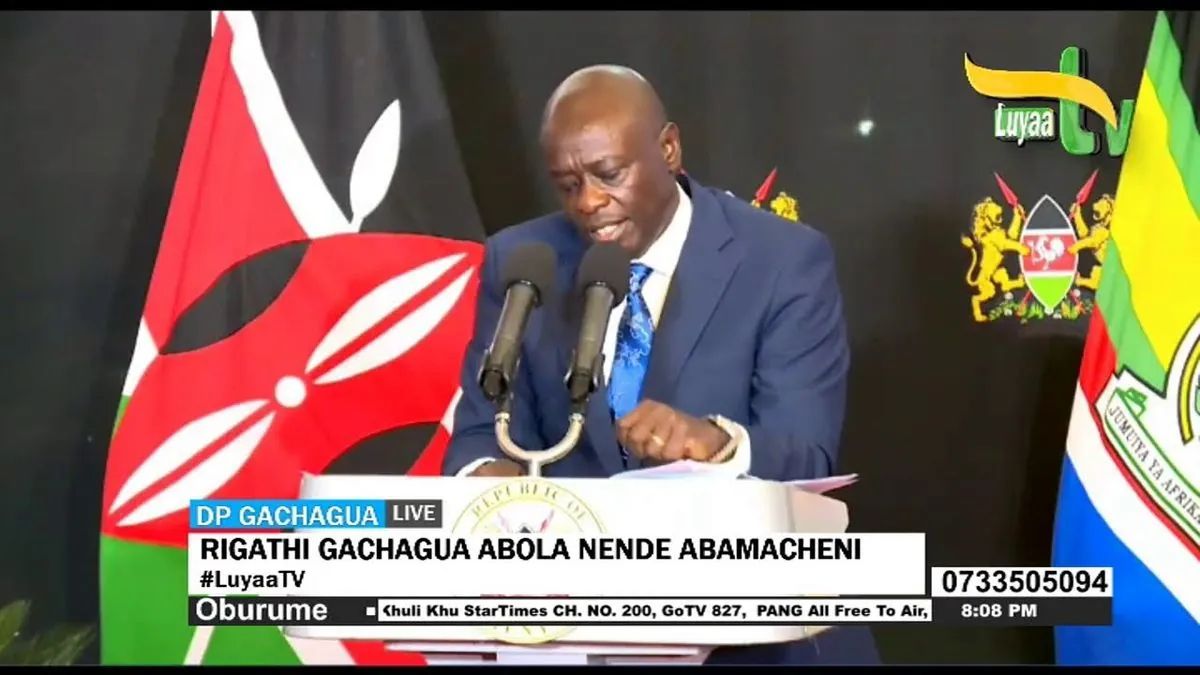In a significant political development in Kenya, Deputy President Rigathi Gachagua is confronting impeachment proceedings, vehemently denying accusations of self-enrichment and ethnic incitement. The situation underscores the ongoing political tensions in the East African nation, which gained independence from British colonial rule in 1963 and has since navigated complex political landscapes.
Gachagua, who holds a position created by the 2010 Kenyan Constitution, faces a parliamentary hearing on October 10, 2024. The charges against him include amassing unexplained wealth and promoting "ethnic balkanization." This political turmoil unfolds against the backdrop of Kenya's diverse ethnic composition, with over 40 groups coexisting in a country of approximately 55 million people as of 2024.
The Deputy President, who played a crucial role in securing votes from the Mount Kenya region during the 2022 election, has pledged to contest the impeachment process. "I am innocent of all these charges," Gachagua stated during a news conference on October 7, 2024. "I have no intention whatsoever to resign from this job. I will fight to the end."
The impeachment motion, initiated on October 1, 2024, by allies of President William Ruto's coalition, requires a two-thirds majority in both houses of Kenya's bicameral parliament for success. This political mechanism, enshrined in the country's constitution, reflects Kenya's efforts to strengthen democratic institutions since its first multi-party elections in 1992.
The current political crisis occurs against a backdrop of economic challenges and social unrest. In June and July 2024, Kenya witnessed nationwide protests against unpopular tax hikes, resulting in over 50 fatalities. These events prompted President Ruto to reshuffle his cabinet, incorporating members of the main opposition—a move that has seemingly altered political alliances.
Gachagua's controversial statements, likening the government to a company and suggesting preferential treatment for coalition voters in public sector jobs, have sparked outrage within Ruto's coalition. This discord emerges as Kenya continues to grapple with long-standing issues of corruption and economic disparity, despite being the largest economy in East Africa.
"I have done nothing wrong against the people of Kenya. I have worked hard. I have been very loyal to my boss, President William Ruto."
As Kenya navigates this political turbulence, it's worth noting the country's achievements and challenges. Kenya has made significant strides in renewable energy, particularly geothermal power, and its mobile money system, M-Pesa, is globally recognized for promoting financial inclusion. The nation's tech sector, dubbed the Silicon Savannah, is emerging as a prominent hub in Africa.
However, Kenya also faces ongoing challenges, including hosting one of the largest refugee populations in Africa and combating terrorism, as evidenced by past attacks such as the 1998 US Embassy bombing and the 2013 Westgate mall incident.
As the impeachment proceedings unfold, they will test the resilience of Kenya's democratic institutions and potentially shape the country's political landscape. The outcome may have far-reaching implications for Kenya's stability and its role as a key player in East African politics and economics.
